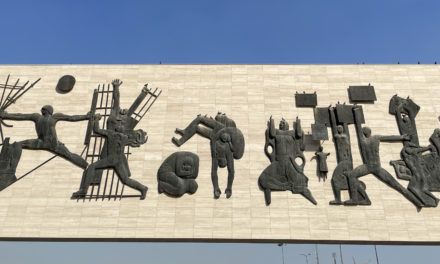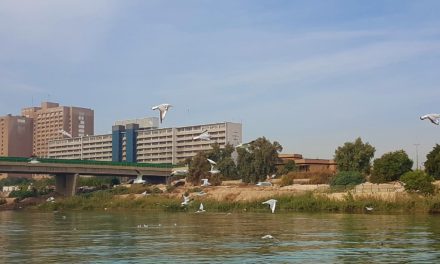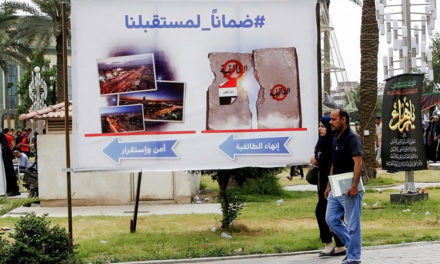An impending threat to national security could emerge sooner rather than later if serious measures are not taken to address Iraq’s water shortages. Mesopotamia, the land of the Euphrates and Tigris, is where some of the oldest and most notable empires built the Cradle of Civilisation. Thousands of years later, like many across the Middle East and North Africa, these rivers are drying up at an alarming rate alongside hopes for some peace in this beleaguered region of the world.
The Euphrates and Tigris account for much of Iraq’s surface water supply and a perfect storm of decades of mismanagement due to endless wars and corruption, population growth, the rapacity of neighbouring countries and worsening impact of climate change has left Iraq in a very vulnerable position when it comes to the most essential element of life.
The threats posed to Iraq’s national security by the inevitable droughts are innumerable, with the most obvious being famine, epidemics of water-borne diseases due to contamination and socio-economic instability leading to violence and extremism. On the economic front, agriculture has been billed as one of Iraq’s most promising sectors in the struggle for economic diversification. Facing a compounding water shortage, that idea could sadly be stillborn.
Humanitarian disasters due to water shortages are already not far away in Iraq, with a recent small-scale drought in Diyala province nearly forcing a large wave of internal displacement. Speaking to media outlets in January, Mohammed Al-Obeidi, the head of Al-Azim’s local council warned that up to 35,000 residents were on the brink of leaving their homes due to power blackouts and damage to local water pipelines leading to a severe drinking water shortage that had lasted a week. Such episodes are not uncommon across the country.
In southern Iraq, water scarcity has instigated tribal disputes that have culminated in armed clashes on more than one occasion. The arid nature of much of the country’s southern desert landscapes makes water an even more precious resource, and water shortages will likely prove to be a catalyst for more violence among southern tribes, who have already shown that they require little reason to pick up their weapons. There is also a dreaded scenario in which water shortages could also inflame sectarian tensions in the long-term as most of the nation’s major dams are located in Sunni-majority areas. In the event of severe droughts, they could demand a reduction in the release of water to areas in the country’s Shi’a-majority south.
Turkey, Syria and Iran have controlled the flow of water into Iraq for decades and are all moving ahead with plans to repair or build dams that will divert or decrease the release of water into Iraq, exacerbating the water crisis further. The most troubling development is Turkey’s gigantic Southeastern Anatolia Project (GAP), which has been decades in the making and is comprised of 22 dams and 19 hydraulic power plants. Coupled with Syria’s plans to build three more dams on the Euphrates and double its irrigated land, Iraqi water expert Shwan Mohammed recently estimated that upstream development of the Euphrates could reduce the amount of water entering Iraq via the integral river by up to 75%, leading to a stunning array of issues including “diminished water for agriculture, greater land degradation due to expected high salinity, more drying of Iraq’s marshes causing more ecological damage… less hydropower generation, increased risk of regional conflict and demographical implications”.
At a recent “National Water Diplomacy and Opportunities for Hydropolitics in West Asia” conference in Tehran, Yahya Rahim Safavi, a former Islamic Revolutionary Guard Corps commander, discussed the need for addressing the estimated 7 billion cubic metres of annual water flow into Iraq, saying, “We do not want [this issue] to be dealt with by the military and hard power and [we should instead] use soft power and diplomacy to bring about common engagement”. Talk of utilizing “soft power” is all well and good but such comments shine a light on a hard truth: the military option is on the table. As disconcerting as it is, this is a reality that both the Iraqi armed forces and government must actively prepare for while pursuing more peaceful outcomes.
Iraq should also consider the legal option of pursuing countries like Turkey in international bodies such as the International Court of Justice and the United Nations Security Council for flagrant violations of international conventions and treaties concerning water security. For now, Iraq is relying on diplomacy and seems to be making modest, short-term progress. During a recent visit to Iraq, Turkey’s Foreign Minister Mevlüt Çavuşoğlu announced that, “ We have postponed collecting water at the Ilısu Dam to June 1. We have also agreed to increase the amount of water we allocate to Iraq from 50 cubic centimeters per second to 90 cubic centimeters per second, in line with Iraqi demands. We are always ready to share water with our Iraqi brothers as with all the gifts God pledges to us.”
However, such temporary solutions and promises can be upended at any moment due to the volatile nature of Middle Eastern geopolitics. Disputes between Iraq and Turkey over complex matters such as the illegal presence of Turkish troops in northern Iraq could trigger the Turks to weaponise water and dams on short notice. In such an event, questions must be raised in regards to Iraq’s preparedness and ability to militarily secure its rightful share of water from sources inside its neighbours’ territories.
Da’ish already taught Iraqis a harsh lesson with respect to water’s usefulness as a weapon. After capturing Syria’s Tabqa dam in 2013 and realising the benefits that can be obtained by controlling such key infrastructure, Da’ish prioritised Iraqi dams during the 2014 takeover of more than a third of Iraq. In early 2014 (prior to the collapse of Mosul in June), Da’ish closed the floodgates of the Fallujah dam, resulting in nearly devastating water shortages in several Iraqi cities, particularly Karbala and Najaf, and flooding in areas upstream of the dam. Then the floodgates were opened in a successful attempt to halt an Iraqi army offensive to retake Fallujah. These actions resulted in the displacement of tens of thousands of Iraqi civilians. In September of 2014, Da’ish captured the Sudur mini-dam in Diyala and proceeded to deprive nearby Shi’a villages and towns of their water supply. Heavy fighting and aerial bombardment prevented Da’ish from controlling the Haditha dam in western Iraq which is the country’s second largest dam and had the potential to unleash humanitarian disasters in the form of droughts, flooding, power blackouts and crushing agricultural and economic activity across much of the country. As for Mosul dam, its potential destruction by Da’ish could have led to the deaths of millions of Iraqis. The country’s hydrological vulnerabilities have not only left it at the mercy of the climate and its neighbours, but also, at times, at the mercy of terrorists hell-bent on bringing Iraq to its knees.
Da’ish terrorists exploited water scarcity as a propaganda tool to convince Sunni communities that they should turn their backs on Baghdad and instead fall in line with the terror group’s vision for the country. Ignoring the fact that all ethno-sectarian components in Iraq suffer together from droughts, bouts of low clean drinking availability and even flooding, Da’ish used extreme changes in weather conditions to inconspicuously descend upon Sunni areas bearing cash gifts, fuel and even water with promises of more resources if the locals sided with them against the government. This was part of the “hearts and minds” strategy that proved successful in many Sunni villages and towns. When June 2014 takeover of northern Iraq came around, many Iraqi soldiers and civilians from religious minorities reported that their neighbours betrayed them and sided with the invading Da’ish forces at a moment’s notice. These were the Sunnis that Da’ish bought with water, among other things.
Heavy rainfall throughout the month of February has thankfully averted the expected droughts this summer, replenishing several key reservoirs across the country, particularly in Diyala province. However, torrential rain simply cannot be relied on exclusively to ease the pressure on Iraq’s water supply, especially as the Middle East is said to be facing an “apocalyptic” future at the hands of climate change. In July 2016, Iraq’s Basra hit news headlines around the world (as a runner-up to Kuwait) for recording the second hottest temperature “ever reliably measured on Earth”.
Moving forward, Iraq faces a breath-taking amalgam of economic, security and social issues that will take years if not decades to resolve. However, the water crisis facing the country is an existential problem that must be prioritised by whoever is elected in May’s elections. Preventing terrorists from using water as a battlefield weapon against Iraqis and reining in attempts at hydrologic hegemony by Iraq’s neighbours are matters that the Iraqi government must tackle before it is too late to salvage the country’s long-term future.

Haidar Sumeri
Haidar Sumeri is a Middle East observer, mainly focusing on Iraq’s war on terrorism.










